IN THIS ISSUE
Letter from our Executive Director
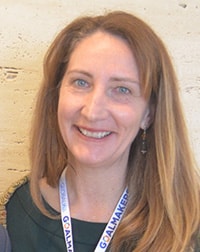 Natural disasters across the world are increasing in frequency and intensity, which can be linked to climate change. Scientific modeling predicts that these trends will increase in the future. Thus, the work our Global Washington members engage in to respond and mitigate natural disasters is more important than ever. Our Global Washington members are leveraging advanced technology alongside localized community engagement, which proves to be a powerful approach for building resilience against climate-related disasters in low- and middle-income countries. Here are some key elements used by GlobalWA members, and read more in the articles following.
Natural disasters across the world are increasing in frequency and intensity, which can be linked to climate change. Scientific modeling predicts that these trends will increase in the future. Thus, the work our Global Washington members engage in to respond and mitigate natural disasters is more important than ever. Our Global Washington members are leveraging advanced technology alongside localized community engagement, which proves to be a powerful approach for building resilience against climate-related disasters in low- and middle-income countries. Here are some key elements used by GlobalWA members, and read more in the articles following.
- Digital Infrastructure and Software Resilience: Companies like Amazon and Microsoft leverage digital infrastructure, cloud services, disaster mapping, and AI to enhance disaster response, coordination, and prediction.
- Community Engagement: Organizations like Give2Asia, UNHCR, UNICEF USA, and World Vision emphasize community engagement, education, and empowerment to build resilience from the ground up.
- Humanitarian Aid and Partnerships: Various organizations collaborate with partners, governments, and local communities to provide humanitarian aid, including cash assistance, food security, healthcare, and infrastructure support.
- Long-term Resilience Building: Efforts extend beyond immediate relief to include sustainable livelihoods, infrastructure development, and disaster risk reduction to ensure long-term resilience.
You can also view the recording of the Goalmaker conference session about this topic here and read the full conference report online. The conference was just the beginning of the conversations and connections taking place in the GlobalWA community. Stay tuned for more opportunities in 2024!

Kristen Dailey Executive Director
Back to Top
Issue Brief
Growing a Stronger Tomorrow
Impactful Approaches to Long-Term Climate Resilience
By Aneesh Chatterjee
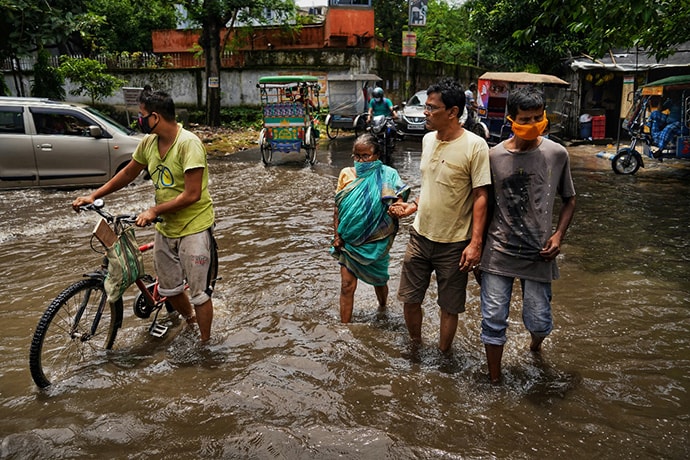
Flooding in Kolkata, India. Photo: Dibakar Roy/Unsplash
Up to 12,000 casualties were reported from worldwide climate disasters in 2023, according to Save the Children, across roughly 240 climate events including floods, storms and wildfires. Amid a reported tenfold increase in worldwide climate incidents between 1960 and 2019, predictions estimate a rise of 1.5C in global temperatures within coming decades, leading to greater and more destructive incidences of hurricanes, droughts, wildfires, and heat waves.
In the face of such destructive events, GlobalWA members are working to not only deliver life-saving aid in the wake of climate disasters but take innovative steps to build preparedness for future events. Kezia Fernandes, the project Lead for Amazon’s Disaster Relief & New Initiatives, emphasized the effectiveness of data collection to identify potential hazard hotspots in a plenary conversation at the 2023 Goalmakers Conference hosted by Global Washington, while Sheena Agarwal, Vice President of Operations at Give2Asia, highlighted the importance of grounded community engagement when building climate resilience. The combined approaches of technology and localized engagement are best exemplified in the efforts of GlobalWA members to combat the most devastating impacts of climate change.
Digital Infrastructure and Software Resilience
Amazon’s work in disaster relief is broad in scope and impact, ranging from donations to leveraging global supply networks for effective deliveries of vital supplies. To maximize the efficiency of communication and relief deployment, Amazon works to improve networks, simplify logistics, and streamline access to relief services during times of crisis. Novel software solutions bolster preparedness and fortitude among communities. Amazon Web Services (AWS) enables communities burdened by natural disasters to regain access to cloud connectivity by sending volunteers into target regions and rebuilding vital network infrastructure – one of the many varied and scenario-specific solutions delivered by Amazon’s volunteer teams. The streamlined cloud services enable quick coordination, efficient data collection, and responsive deliveries of critical aid.

AWS Disaster Response innovates resilient methods of bolstering disaster preparedness through digital infrastructure support. Beyond efforts by AWS volunteers to restore telecommunications in disaster-struck regions, AWS utilizes cloud technology to provide responders with quick and organized access to disaster mapping data. By allowing local support personnel to submit data to a centralized cloud platform, data collection and reporting in disaster management is heavily streamlined, reducing weeks of time in ascertaining the extent of damage and the relief supplies required. Disaster mapping is one of many software solutions AWS produces, prioritizing open access and sharing of data to bolster preparedness among governments and non-profit actors.
In the wake of Hurricane Dorian in 2019, for instance, Amazon volunteers worked with partner agencies like Red Cross, Mercy Corps, and Save the Children to coordinate the large-scale deliveries of specifically-requested relief items, managing the logistical processes of aid delivery such as packaging and storage on planes, working with local institutions to plan for flights into critical areas with damaged infrastructure, and managing the distribution of aid supplies from delivery planes to at-risk communities.
As the Honduras example shows, aid distribution is another cornerstone of Amazon’s disaster relief programs, alongside logistical support and planning. In 2021, Amazon supported communities in Mississippi and Texas during severe water shortages brought on by snowstorms. By coordinating with the American Red Cross, ChildFund International, World Central Kitchen, Feeding America, Good360, and other organizations, Amazon donated over 1.2 million water bottles to be delivered through distribution centers across the region, in addition to blankets, warmers, and hygiene supplies. In 2022, Amazon’s humanitarian aid hubs in Poland and Slovakia were essential in distributing over 30,000 medical aid supplies to hospitals in Ukraine, flown from Atlanta, Georgia and distributed with the help of the International Medical Corps. More recently, in February of 2023, Amazon’s “Away Team” coordinated the delivery and distribution of aid supplies to regions devastated by the Turkey-Syria earthquakes. Further resilience-building efforts by Amazon in the same region included the Smiling Dreams Community House project in Turkey, an institution to house and support victims of the earthquake by providing education, therapy, and trauma recovery.
Leveraging the power of machine learning and artificial intelligence, Microsoft provides a wide range of software solutions to build resilience and disaster preparedness among nonprofits in the field. In partnership with Team Rubicon, ITDRC, Mercy Corps, and the American Red Cross, Microsoft developed a data model for disaster response that streamlines the efficiency of recording disaster data, sharing between active parties, organizing responses, and creating informative case assessments through the Asset Management branch of the Microsoft Dynamics 365 Nonprofit Accelerator. Frontline Humanitarian Logistics, another branch of focus for the Accelerator, manages the on-the-ground logistics behind aid delivery, storage, shipment and tracking, utilizing the Frontline Humanitarian Logistics Data Standard – an initiative by NetHope and partners – to build a sector-wide, dynamic data model that efficiently connects donated resources to corresponding program services.

Microsoft also works to use AI in accurate predictions for incoming natural hazards, greatly increasing community preparedness in targeted regions. Working with SEEDS, Microsoft’s AI for Good Lab developed Sunny Lives, an AI model that uses satellite imagery to determine which households are most likely to be most affected by a cyclone – greatly mitigating the time required to collect data about individual homes. In 2020, the insight collected from Sunny Lives predicted the communities most at risk from flooding induced by cyclones Nivar and Burevi, allowing SEEDS personnel to engage directly with thousands of people and distribute vital survival guidelines days before the storm. The same AI model was used in New Delhi, India to determine which regions within communities were most likely to be impacted by oncoming heat waves in 2022, helping civilians, local authorities and aid workers prepare in advance for resource distribution and preliminary warnings. Beyond Sunny Lives, other sectors of focus – such as hunger – also benefit from Microsoft’s work in AI: a data model built with machine learning algorithms was deployed to predict the onset of food shortages with 83% accuracy, based on surveys collected from communities in Malawi.
Strength in Community Engagement
Beyond digital innovation, other members encourage disaster preparedness through on-the-ground interventions, advocacy, and collaboration. Give2Asia brings a multi-tiered approach to disaster preparedness. Through consistent risk assessment practices, organizing community groups to educate people on preparedness, developing contingencies, and organizing grants, Give2Asia’s NGO Disaster Preparedness Program (NGDPP) ran in 8 countries from 2014-2021. Using online forums, the program connects local community groups across Asian countries to discuss mitigation and risk reduction practices, strengthening resilience against environmental hazards. Scalable grants provided organizations with the funding they need to implement their case-specific solutions, encouraging autonomy and the development of ideas tailored to the circumstances of specific regions. Another key component of the program is knowledge generation for donors. Although risk reduction and resilience are a safer choice than reactionary intervention following an event, private donors may be more likely to fund interventions following a disaster. Give2Asia prioritizes educational messaging for philanthropic parties to keep them aware of the importance of responsible giving, beyond providing relief following an event. With the NGDPP having been rebranded in 2022 as the DisasterLink Network, Give2Asia continues their work across the continent to bolster resilience at household and community levels.

Community interventions are a key component of Give2Asia’s resilience development. DisasterLink partners, working from predictions made by the Bangladesh Meteorological Department, successfully assisted locals during the approach of Cyclone Mocha in 2023, facilitating timely alerts to the most at-risk communities in the region, evacuations, and redirection to shelters, moving roughly 750,000 people out of severe risk. Beyond immediate interventions to prevent disasters, Give2Asia works extensively to strengthen communities through consistent education. Through awareness campaigns that introduce people to the kinds of possible natural disasters to practice drills for emergency situations, disaster preparedness is even interwoven in school curricula, including first aid, environmental sustainability, and preparedness basics.
The DisasterLink Network expanded in September, 2023, introducing new partner NGOs across 15 countries. With 51 total partners, the Network connects participants with risk mitigation resources, emergency relief aid and supplies, WASH infrastructure, and economic development for building livelihoods.
Another organization addressing disaster preparedness and response with sustainability in mind is the UNHCR, working toward fulfilling the goals of their 2022-2026 Strategic Directions, and adhering to the standards of the UN Framework Convention on Climate Change.

By 2030, the UNHCR aims to ensure the safety of climate refugees across borders, provide sustainable, eco-friendly resources to displaced persons and host countries, build resilience among displaced persons, teach governments on preparedness for future crises, while incorporating a climate-friendly approach to the implementation of their plans such that the organization’s carbon footprint is managed responsibly. To grow resilience and preparedness in managing displaced persons, the UNHCR emphasizes the tenets of the Refugee Convention to promote awareness of how to best keep asylum seekers safe until they are re-settled. During transition, displaced persons are provided with access to clean water, sanitation supplies, health centers, schools, and environmentally-friendly public services – for which the UNHCR advocates with local host governments.
The development of sustainable livelihoods for displaced persons is also a priority of the UNHCR. In South Sudan, climate resilience is bolstered by converting flooded areas into farmland, providing versatile economic opportunities and restrengthening communities. The UNHCR also provides renewable energy to over 250,000 climate refugees in Pakistan, clean water access for refugee communities in Uganda, and pre-planned cash assistance for targeted communities in Malawi, when predicted climate disasters present themselves.
Disaster preparedness is directly addressed by the UNHCR’s assistance coordination efforts. Their Refugee Coordination Guidance Note lays the groundwork for a collaborative aid effort among partner organizations, providing active participants with risk monitoring reports, tailored contingency plans, and efficient aid delivery processes for any particular crisis – all in coordination with the host government of the targeted region. Intervening organizations are provided with strategies and specific solutions for both refugees and host governments, ensuring that all participants are up to date, can collaborate successfully, and divert aid accordingly.

UNICEF USA brings similar approaches to community engagement, with a specialized focus on helping children cope with the impact of climate disasters. Through investments in projects designed for localized regions, UNICEF USA prioritizes data collection, the provision of adequate healthcare facilities, and access to basic education for children in at-risk communities, funding resilience in partnership with other organizations, local governments, and donors. Encouraging advocacy in children is another way UNICEF raises awareness about the potential opportunities and access to resources they may have, building connectivity within communities.
Direct interventions with affected communities are a key component of interventions by World Vision, building climate resilience at multiple levels of scale, from the individual household to coordinated infrastructure support.

Cash assistance is one of the ways communities are supported and made more resilient in the wake of climate disasters. Allowing individuals and families to afford options, mobility and access to resources not only improves immediate living conditions, but works to support the economy in a time of crisis. Using cash and voucher transfers, World Vision has assisted over 7.8 million people across 46 countries in 2022.
Addressing food insecurity is another key component rebuilding communities. Through their General Food Distributions program, World Vision delivers meals to at-risk groups and communities during emergencies, ensuring that malnutrition is kept in check – especially for children under five and pregnant women. The provision of guaranteed school meals not only increased the likelihood of attendance, but provides access to clean water, sanitation, and protection, alongside continued education. By partnering with the World Food Programme, World Vision addressed hunger for up to 11.5 million people across the globe. In 2021, up to $8 million was allotted for emergency healthcare services across 14 countries, combating malnutrition, providing mental health support, assisting high-risk vulnerable groups to prevent diseases, emphasizing infant and child nourishment during emergency situations, and bringing community organization and therapy groups. In the same year, $120 million was directed to fund WASH initiatives, with 786,000 beneficiaries of emergency drinking water, 195,000 recipients of sanitation facilities, and 345,000 people granted access to hygiene supplies.
Settlement fortitude is a priority for Global Communities. To strengthen communities against the worst impacts of climate disasters, informal urban settlements are bolstered with infrastructure planning and organization, including effective sewage systems and proper roads, enabling both a greater resilience to natural hazards like flooding and more readily accessible evacuation routes. This strategy was exemplified by Global Communities’ 2010 intervention in Port-au-Prince, Haiti, bringing an $8.6 million investment into the reconstruction of the Ravine Pintade neighborhood in the wake of an earthquake. The 18-month project removed debris, built adequate housing and public infrastructure, and enabled the community to rebuild efficiently.

In addition to direct rebuilding efforts, Global Communities also strengthens communities by way of partnerships and funding preparedness. In a joint venture with Willis Towers Watson, Hannover Re, and the Insurance Development Fund, the InsuResilience Solutions Fund (ISF) was founded to build climate resilience in Colombia in 2023. Built with financial defense in mind, the ISF delivers payouts based on preset parameters of climate destruction, determined both by historical climate data and the live data of any given dangerous climate event.
A comprehensive disaster response is exemplified by the efforts of the Spreeha Foundation and their projects in Bangladesh under the Aalo Program. With the region being highly prone to cyclones, flooding, storms, and other crises, Aalo sought to address disaster preparedness with grounded and systemic response plans that provide emergency relief and fortify communities for future disasters. Multiple response projects between 2017-2022 chart Spreeha’s work to support refugee communities in Bangladesh, provide vital relief during the COVID-19 pandemic, strengthen local healthcare and digital access infrastructure, and bring relief supplies and cash assistance to impacted communities. From preschools and community engagement for Rohingya refugees to PPE for frontline workers during the pandemic, food, healthcare, and cash assistance during floods and storms, long-term nutritional assistance, safe and easy access to medicine and doctor consultations and comprehensive screening for medical conditions, Spreeha’s broad-spectrum approach addressed disaster resilience at multiple levels of engagement.

These projects were implemented in partnership with Give2Asia, BIN, the University of Washington, Confidence Group, United Commercial Bank, Uber Bangladesh, Shakib Al Hasan Foundation, and other private donors to benefit over 200,000 people over the course of the program.
Disaster preparedness is undeniably the best line of defense against future calamities, predicted to be an inevitability according to the current pace of climate change. By leveraging the modern benefits of advanced software, data collection, machine learning and artificial intelligence, alongside grounded, localized community engagements that decentralize the engagement process for the most effective results, prove to be a strong combined approach to build resilience against environmental hazards for the world’s most at-risk communities.
In addition to the above organizations, the following GlobalWA members work on disaster relief and emergency response, as well as building disaster resilience through their programs in communities where they work.
Amazon
Amazon’s disaster relief and response efforts utilize our global logistics capabilities to provide the fastest, most effective aid. These strengths enable us to ship Amazon-donated items, and items donated by partners, to communities as soon as possible after a natural disaster. Since 2017, Amazon has donated more than 23 million relief items to support people impacted by over 108 disasters around the world.
Americares
More than Forty Years of Responding to Disasters
Natural disasters, poverty, disease, and war impact millions around the world. Americares provides disaster preparedness, medical aid, disaster relief and recovery.
The past year and more have highlighted the increasing frequency and severity of overlapping crises – driven by extreme weather events, the worst earthquake in nearly a century in Türkiye and Syria and the War in Ukraine. This trend has had a devastating impact on health, particularly among groups vulnerable to disasters, as communities have struggled to rebuild from concurrent and consecutive events.
When disaster strikes, we commit right away because lives are at stake. Our Emergency Response Partners provide a foundation for our response capability. And you, as members of our donor community, give us the resources to respond and remain whenever, wherever we are needed.
CARE
CARE has 75 years of experience in delivering life-saving humanitarian assistance while supporting communities with sustainable development programs. Today, together with partners, our humanitarian projects reach 20 million people across 67 countries. CARE works to transform the humanitarian sector by putting gender at the center of our responses, ensuring gender-sensitive community-led interventions, that protect people’s dignity while building resilience and social cohesion.
CARE takes a comprehensive approach to emergency responses: first by working with communities to prepare for and mitigate the impact of disasters; then by partnering with local groups to provide immediate assistance when an emergency hits across various sectors including, water hygiene and sanitation, shelter, food and nutrition, and sexual and reproductive health; and finally, by working with affected communities to help them recover after the crisis has passed. CARE’s emergency response is part of a long-term commitment that places great importance on building local capacity and lasting resilience.
CARE’s 2030 Goal is to provide quality, gender-focused and localized humanitarian assistance to 10% of those affected in major crises, reaching at least 50 million people by 2030.
ChildFund
In any emergency – violent conflicts, pandemics, droughts and other natural disasters – children are the most vulnerable. Beyond the short-term risks they face from being separated from their families, getting hurt or even dying, children often miss school and are at increased risk of violence, neglect and exploitation. Unfortunately, in the intense chaos and demand for resources during and after a crisis, children are often the last to receive the support they need.
That’s where we come in. During emergencies, the focus of ChildFund is always on the children – on providing the things they most urgently need to survive and thrive after a disaster, including not just physical relief items but also psychological and emotional support. See just a few of the emergencies we’re currently responding to below and learn how your donations support children in crisis.
Global Communities
Global Communities works at the intersection of humanitarian assistance, sustainable development and financial inclusion to save lives, advance equity and secure strong futures. We support communities at the forefront of their own development in more than 30 countries to achieve a shared vision of a more just, prosperous and equitable global community. At a time when natural disasters and conflicts are becoming more common and devastating, we offer emergency response and share knowledge and resources that communities need to recover from crises and foster lasting resilience in the face of constant change. In Ethiopia, for example, our Resilience in Pastoral Areas South (RIPA South) program works with communities affected by drought and conflict to strengthen disaster risk management and planning, improve crop and livestock production, and increase access to livelihood opportunities for individuals transitioning out of pastoralism, especially women and youth. In Ukraine, we have adapted our Decentralization Offering Better Results and Efficiency (DOBRE) program to provide rapid emergency response, strengthen crisis governance and promote social cohesion. We also implement the Community-Led Emergency Action and Response (CLEAR) and the Piloting Early Recovery and Livelihoods Assistance (PEARL) programs to support war-affected people and businesses. Learn more at globalcommunities.org and explore our visual Crisis to Resilience series.
Jewish Humanitarian Response (JHR)
JHR has been active since August 2021, providing relief, rescue, and resettlement to vulnerable Afghans facing inhumane living conditions and threats under the Taliban.
An Afghanistan Rescue Campaign
JHR was spearheaded by the Aleph Institute and the Raoul Wallenberg Centre for Human Rights. JHR leverages an extensive international network to respond with high-level diplomacy, expert NGO partnerships, and ground coordination with experience in rescue and evacuation work. JHR also raises the funds necessary to execute the response mandate.
A Human Catastrophe
Vulnerable Afghans are facing increasing risk levels as the international community loses focus and the Taliban expands their stifling control. Hunger, unemployment, and human rights abuses are preventing Afghans from shopping, working and going to school, making them targets for beatings and interrogations.
Microsoft
Helping organizations accelerate impact
Our technology empowers humanitarian organizations to better prepare, respond and rebuild communities affected by crisis. With free and discounted software and services, data and AI, Microsoft helps nonprofits build resiliency and accelerate their missions.
AI for Humanitarian Action
A grant program to help nonprofit and humanitarian organizations supporting disaster response, refugees and displaced people, human rights, and the needs of women and children.
Outright International
Outright International’s role in disaster relief and preparedness primarily focuses on advocacy aimed at the humanitarian sector to be more inclusive of LGBTIQ+ needs and priorities before, during, and following humanitarian crises. Why? Because we know that during humanitarian crises, LGBTIQ+ people may face even higher levels of stigma, discrimination, and exclusion, especially where pre-existing social norms already marginalize our communities. In Ukraine, for example, we are currently working in Ukraine to ensure that LGBTIQ+ people are fully included in the country’s humanitarian response. In addition, we have disbursed nearly $3.6m to national LGBTIQ+ organizations through our Ukraine Emergency Fund to address the humanitarian needs of their communities.
Oxfam
Oxfam has a long and well-recognized record of humanitarian relief in times of crisis. When disaster strikes, we respond – delivering high quality lifesaving assistance and essential protection to the most affected. We make sure people can get clean water to drink and decent sanitation. We provide help for them to get food and the essentials they need to survive, and we work with people on the journey to self-sufficiency.
Through our long-term development programs, we stay well after the dust has settled to help rebuild communities to come back stronger from disaster and support them in being better prepared to cope with shocks and uncertainties.
Building resilience and local capacity
The scale and nature of these humanitarian crises have led us to put more emphasis on building the resilience of affected populations and increasing national and local response capacity and ownership. We recognize that local responders are often the best placed to help in emergencies, and we work with governments, local organizations and communities so that they are ready to respond in emergencies, and able to cope when crisis hits.
Supporting women’s rights and gender justice
In all our responses, we prioritize the needs of women and girls, who are often discriminated against or have fewer resources to face and recover from emergencies. We promote the safe and accessible use of our humanitarian programs by women and girls, and support women’s organizations to lead in emergency preparedness, risk reduction and response.
Campaigning and influencing others
The goal of our campaigning is not just to speak for people in need, but to open the way for them to speak for themselves. A key part of our humanitarian work is campaigning and using our influence to make sure women, men and children are provided the assistance they need and have their rights respected. We also seek to address and ultimately remedy the political and structural root causes of their vulnerability.
Spreeha Foundation
Spreeha is on a mission to transform lives by empowering people with empathetic and sustainable solutions to the toughest problems in Bangladesh. Addressing the country’s vulnerability to natural disasters, increased health risks due to environmental degradation and climate change, Spreeha designed its emergency disaster response program Aalo, “the light” in English. The program aims to help rebuild the lives of people and communities affected by disasters and public health hazards and increase community resilience.
The program works around four components – disaster preparedness through heightened awareness, emergency healthcare during the time of distress, essential relief materials, and cash grants to restore livelihood like before. Leveraging 7 years of experience in disaster response, Spreeha’s Aalo program has impacted more than 200,000 lives. The program has worked in three critical areas – Refugee Response starting in 2017, Natural disaster response which includes annual cyclone and flood occurrence, and public health hazard response which includes COVID-19, Dengue, and Cholera outbreaks.
Spreeha is committed to continuing rebuilding communities and fostering community resilience in the face of adversity with the help of its trained community workers, pool of physicians and public health experts, stakeholders, and partners.
Starbucks
The Starbucks Foundation’s mission is to strengthen humanity by transforming lives across the world, with a focus on enabling community resiliency and prosperity and uplifting communities affected by disaster.
Our grants invest in preparedness, response and resilience programs around the world. We do this through partnerships such as the American Red Cross and World Central Kitchen, which allows for quick response to provide relief and comfort to people affected by disasters big and small, as well as support to help our grantees serve and meet the unexpected needs of local communities. The Starbucks Foundation also invites Starbucks partners (employees) and customers to join in supporting relief efforts, such as donating coffee to first responders or making a donation via the Starbucks mobile app in support of our nonprofit partners.
Together, we have helped to uplift communities, from wildfires and hurricanes across the U.S. to flooding in Brazil and earthquakes in Türkiye and Morocco.
UNICEF USA
There have been an unprecedented number of humanitarian emergencies unfolding around the world.
Violence in Gaza and Israel. Catastrophic floods in Libya and Pakistan. Devastating earthquakes in Morocco and Afghanistan, a hurricane in Mexico.
Armed conflicts, extreme weather, public health crises and other shocks are threatening more of the world’s children than ever before.
Children who live in a conflict or disaster zone are more likely to be living in poverty. They are more vulnerable to malnutrition and disease. And they are more likely to be out of school.
UNICEF, a global leader in humanitarian relief, responds to hundreds of emergencies every year — delivering lifesaving relief, safeguarding children’s rights and protecting them from harm. To ensure every child survives and thrives, UNICEF promotes targeted action, backed by strategic investment in disaster risk reduction. We aim to reduce risk and strengthen preparedness and recovery for communities and services critical to children, like education, health care and nutrition.
USA for UNHCR, the UN Refugee Agency
When a humanitarian emergency strikes, people are often forced to flee their homes and leave everything behind to make the dangerous journey to safety. During an emergency response, UNHCR, the UN Refugee Agency prioritizes saving lives and minimizing serious harm by meeting the most urgent humanitarian needs. Within the first 72 hours of an emergency, UNHCR can mobilize supplies for 1 million people and deploy expert staff to protect them.
UNHCR assists millions of people in emergency situations every year, including 16.7 million people who received emergency supplies in 2023. UNHCR continually analyzes the risk of emergencies globally so that teams are prepared to respond quickly and effectively. When an emergency breaks:
- UNHCR delivers lifesaving relief items and other critical goods from its global stockpiles, ready in warehouses in strategic locations around the world.
- UNHCR deploys emergency response experts who are trained in crisis management and specialize in key areas like legal protection, cash assistance, shelter and tackling sexual exploitation.
- UNHCR transfers funds from emergency reserves directly to local UNHCR teams on the ground to set up shelters, buy food and register people who need help.
In 2023, UNHCR issued 43 emergency declarations in 29 countries – the highest number in decades – and deployed 339 emergency staff. Thanks to the generous support from public and private donors in 2023, UNHCR could timely provide lifesaving assistance and protection services to those most affected by crises.
World Concern
Assisting families after a disaster gets a community back on its feet and is often the entry point for our work in a new area. We meet immediate needs in a disaster and help rebuild lives, helping families to recover from floods, hurricanes, typhoons, earthquakes, drought or war. Part of recovery is building resilience to future disasters, which is done by training and empowering communities to plan and prepare.
The context in each village is unique. We start with the most critical, urgent needs: water, food, and safety. Long-term, families are equipped to earn income and support themselves. They become healthier, and begin to save and plan for the future. And through it all, they experience the transformative power of God’s love.
World Vision
Starting in 1950 with the Korean War, World Vision has a “first in” and “last out” approach to emergency relief. Our goal is to help families and communities for the long term so they can be resilient and able to help others. More than 90 percent of disaster-related deaths occur in developing countries. World Vision already works in these hard places, responding with life-saving speed when disaster strikes.
Help can have unintended consequences. These best practices are the result of decades of experience, learning, and collaboration among top disaster relief organizations:
- Raise funds ahead of time and pre-position relief supplies around the world.
- Send a seasoned team of experts to assess, plan, and respond.
- Coordinate with other organizations and governments. (Prevent people from falling through the cracks or gaming the system.)
- Carefully plan out distributions of food and relief supplies. Avoid riots and violence, and ensure help for those who need it most.
- Meet urgent, short-term needs, while working toward sustainable, long-term solutions.
Yemen Relief and Reconstruction Foundation
Since March 2015, Yemen has been experiencing a brutal war and a siege that has severely restricted the commercial import of food and medicine. Most food factories and businesses were bombed — creating the largest humanitarian crisis in the world. Today, 24 of the 29 million people in Yemen require aid, 19 million are food insecure, and almost half of the population of Yemen – 14 million — are at risk of famine, 5 million of which are children. Finally, Many Yemenis in the areas affected by the escalation of war have fled to safer places in other Governorates — resulting in over 3 million internally displaced people. YRRF was established to provide relief to those in need in Yemen. We reach the most inaccessible areas due to geography or security risk.
Strategic Aims
To prevent humanitarian disaster by promoting broad awareness of grave health and security issues faced by Yemeni families, raising funds to support critical needs and supporting material relief efforts.
To facilitate a just peace that considers all segments of the Yemeni population.
To advocate and facilitate support for Yemen during the reconstruction period.
Back to Top
Organization Profile
Mercy Corps is Helping Ukrainians Feed, Clothe, and Earn for Themselves
By Ray Mwareya
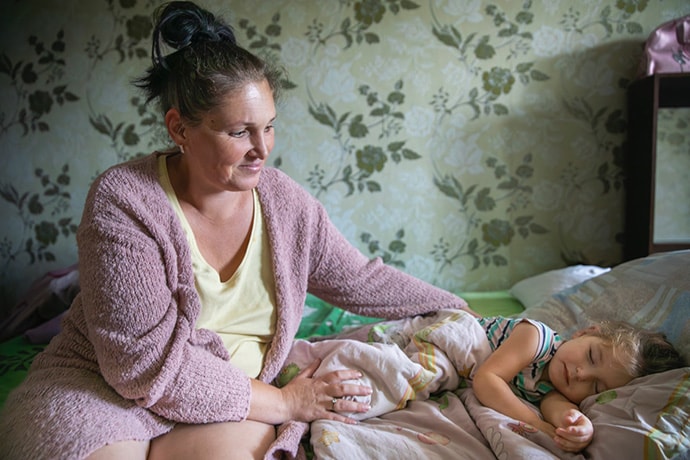
September 2023 – Tetiana wakes her daughter Eva, 2, from a nap. They stayed in their hometown near the frontline through the difficult first year of the war, constant shelling, Russian control of their village, and a flood. Only recently they relocated to a safer location. Mercy Corps provided them with cash assistance, which they were able to use to pay for an apartment.
Mercy Corps has been providing international humanitarian aid for over 40 years, much of it in the form of emergency and disaster relief. Of their nearly 6,000 employees, 95% come from within the countries where they work, which is crucial for providing the right aid to the right populations at the right time. Their primary programs help build resiliency by connecting people across the globe to clean water, nutritious food, better economic opportunities, and more peaceful tomorrows—all critical to unlocking the power of human potential and strengthening communities to better cope during crises, adapt to evolving challenges, and thrive into the future.
For this Organization Spotlight, we were fortunate to have caught up with one of their program leaders working in Ukraine – not a natural disaster, yet a humanitarian disaster caused by human conflict where many of the same emergency response principles still apply.
**********
Mercy Corps – with the support of Trisha Bury, a Strategic Response Manager – is helping Ukrainians feed, clothe, and earn for themselves rather than being passive recipients of aid.
Trisha’s passion personifies Mercy Corps’ global vision “to create a future of possibility, where everyone can prosper.” Hailing from Port Angeles, Washington, she studied international relations and international development in college and grad school.
“I wanted an international career that would challenge me and eventually I ended up in humanitarian aid which I’ve now been doing for over a decade,” she says.
Her work mainly revolves around providing support to Mercy Corps teams around the world; essentially, starting up new programs, plugging in for temporary vacant leadership gaps, or guiding country teams in times of high-impact change. “I deployed to support our teams in Haiti, Central African Republic, Democratic Republic of Congo, Mali, Niger, and Burkina Faso. And now Ukraine,” she adds.
Mercy Corps has a solid humanitarian legacy. It has worked globally in some of the world’s most volatile places for over 40 years – channeling disaster management and recovery work. “We are currently present in about 40 countries. We have over 6,000 staff globally,” she reveals.
From Ukraine to Gaza to Sudan, fresh humanitarian disasters are rolling out every year. It must be hard for Mercy Corps to quickly prioritize who needs help, how much, and for how long.
“Yeah, there really is,” she says of the competing, demanding situations.
One way of making that choice is to work where Mercy Corps can have the biggest impact, leveraging its global and local expertise, and the resources that are available in terms of both funding and human resources.
“Globally, we’re specialized in food security, water security, economic opportunity, and peace and good governance, and humanitarian aid is sort of a cross-cutting area of work that we do,” she says.
Ukraine is among the most challenging humanitarian regions of recent times. As per UN figures – Russia’s invasion has killed 10,000 civilians to date and damaged $138 billion in hard infrastructure as of January 2023.
Between water, food, and medical support for vulnerable Ukrainians, it’s tricky to know what gets priority.
“Needs differ widely across the country. We have people in the east and the south of the country close to the front lines who are affected directly by the conflict. So often we have people whose homes are damaged by shelling; maybe water and electricity services might be cut off. Medical services might also be compromised. Here in Kyiv or over in the west, you have a lot more people who are displaced from those areas; they may have problems re-establishing their livelihoods. Finding houses to rent for the medium- or long-term, until the situation stabilizes in their home region, is key,” she says.
Even different people in the same place can have different needs based on their circumstances, and Mercy Corps’ local partners offer tailored support for marginalized groups : the Roma community or members of the LGBTQI community.
Globally, one of Mercy Corps’ priorities is that our response is increasingly, locally led. “95% of our team members globally are from the countries we work in,” she says, including in Ukraine. It also means partnering with more local organizations that have longer-term experience on the ground. They tend to know the situation the best, what the needs are, and what types of assistance are the most effective.
“We also always coordinate our activities with local and national government authorities and with other actors who are working in the same areas to make sure that we’re giving the right kind of assistance, and that we’re not duplicating assistance from other agencies.”
From big global organizations like the UN or Oxfam, giving people cash directly has proved to be a win-win policy for both civilians and local market traders. This is an approach Mercy Corps likes a lot.
“For about the past decade, one of the things Mercy Corps does is to program more and more through cash, so that it’s something flexible. The people in need can decide for themselves what are the most urgent needs and how they can use cash to meet those needs,” she says.

October 2023 – Yurii, owner of a grain processing factory in a small village in the north of Ukraine, standing in the doorway of his factory building that was severely damaged during the first months of the war. With the grant received from Mercy Corps, Yurii was able to purchase materials needed to rebuild the fire-damaged building, as well as purchase equipment to begin processing grain once again.
Is Mercy Corps covering every part of the country, or is it keeping itself to the so-called safe zones in Ukraine?
“It’s also important to remember there are not any safe zones in Ukraine because even capital cities are being hit with missile attacks,” Trisha says.
Mercy Corps is “sort of everywhere” in Ukraine wherever the neediest people are, she says. Where markets are working, Mercy Corps provides cash. Where markets are not working or where people are not able to leave their homes to access markets they provide in-kind support. Items like food, hygiene supplies, and materials to repair shelters are standard.
Because in Ukraine some populations may be living in intense conflict zones whilst others have a breather from periods of conflict, aid disbursements vary depending on the security situation.
However, the key is to build resilience. “So, we help people re-establish farms or re-establish other types of livelihoods that may have either been disrupted or displaced by the conflict,” she says.

September 2023 – Volodymyr with his daughter, Sasha, 7, in front of his furniture workshop. A husband and father of two, he owned a successful furniture business in his hometown in the Donetsk region. When the danger was too great, the family moved to Dnipro, where Volodymyr had to start his business from scratch. With the help of Mercy Corps’ grant, Volodymyr and his team were able to purchase equipment needed to provide quick, high quality work that helps them to establish their presence as a small business.
Now to the big issue lingering in readers’ minds. The security situation across Ukraine is terrifying. Transport links have been bombed out or mined and crop fields spoiled by bombs. It must be risky for Mercy Corps to get the aid in Ukraine in suitable quantities that the population needs.
“It varies quite a lot,” she says. “Sometimes, we’ll plan an activity a few days, or even weeks in advance, and then an attack happens, and we have to pivot very quickly or cancel something.”
The key is that Mercy Corps has a dedicated security team that helps develop procedures to minimize risk as much as possible.
But, she insists, “there isn’t a safe place in the country at the moment.”
Currently, many Ukrainians are displaced, sometimes out of the country or to other parts of the country. The International Organization for Migration report, as of July 2023, a staggering 5.1 million Ukrainians are internally displaced.
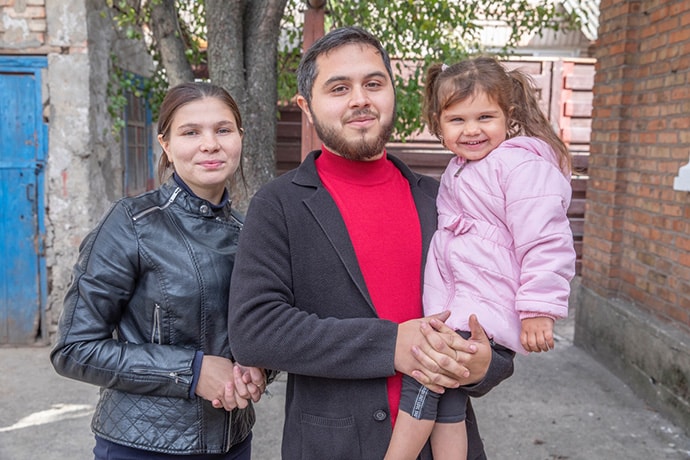
September 2023 – Eduard, his wife Rima, and 2-year-old daughter Lora standing in the yard of their house. They had just started their family when the war escalated. Eduard lost his job and Lora would cry during explosions. Once a bomb fell on their neighbor’s property; while no one was injured, the impact shattered the windows of their home. Mercy Corps multipurpose cash assistance, possible with support of local partner organization “Voice of Romni” helped the family purchase an oven, repair their home, and purchase enough food to store for the winter.
It must be challenging to keep track of who has received aid and to audit the impact of the aid. “Yeah, just like many countries in conflict or climate disasters,” says Trisha. Key measures include coordinating with the government and targeting areas that aren’t already being assisted by someone else.
“We also occasionally, have data-sharing agreements with these other agencies so we can compare lists of people that we’re helping to make sure there’s no overlap or duplication, and we also have an internal monitoring, evaluation and learning team,” she says.
They do in-depth surveys and in-person monitoring when possible, to check the effectiveness of their programs. “We make changes where we find we can be doing something better,” she adds.

September 2023 – Alisa, 6, picks cucumbers with her grandfather Valerii. Alisa’s mother, Maryna, is a farmer and prior to the war, she owned a successful business with more than 60 acres of crops, and two stores in the area. When the war escalated, the family had to leave nearly everything behind. When they found out Maryna’s home and the home of her parents were destroyed, Maryna, insisted that they rebuild, and make a home again. With cash assistance from Mercy Corps, Maryna and her family were able to purchase the metal needed to build a frame, wood for bracing, and an irrigation system.
Mercy Corps plans on staying in Ukraine when the war ends. They already have programs in Ukraine with a focus on the agricultural sector, which will become a priority area for rebuilding.
Back to Top
Goalmaker
Empowering Resilience: Cabdinasir Adan
By Amber Cortes
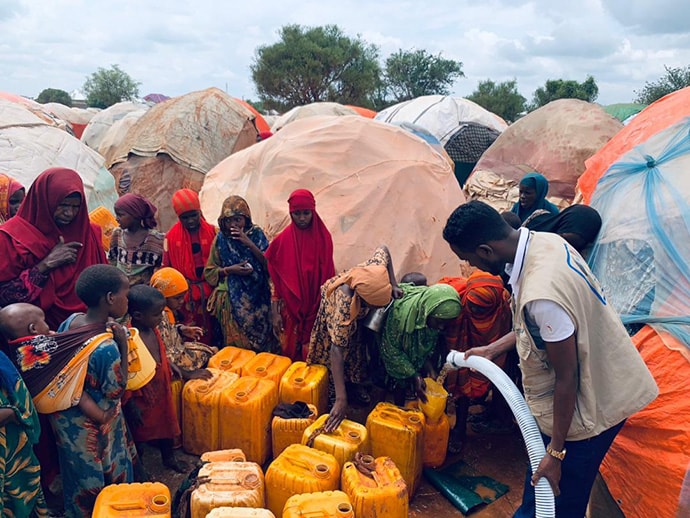
Emergency water supplied by GREDO Somalia. Photo: GREDO
‘Iskaashato ma kufto,’ goes a Somalian proverb: “If people support each other they do not fall.” It’s a sentiment that Cabdinasir Adan, the Food Security and Livelihoods Manager at Gargaar Relief and Development Organization (GREDO), can get behind.
According to Cabdinasir, Somalia faces urgent situations once or twice every year due to frequent droughts, armed conflict and flooding. These natural disasters, compounded by climate change and environmental degradation, continue to strain the capacity of humanitarian aid and underscore the urgent need for resilience-building efforts in Somalia.
One of the most pressing issues facing Somalia today is recurrent droughts, which devastate livelihoods, exacerbate food insecurity, and contribute to displacement and conflict. Last year Somalia faced the worst drought in decades and impoverished millions of people.
Climate change-related shocks, such as flooding and long dry periods (drought) are frequent and common in Somalia. Other climate effects felt include hotter weather conditions and delayed, earlier, and quicker cessation rains compared to historic months of rainy seasons. Climate change consequences lead to failed or severely reduced local food production causing chronic food insecurity, loss of livestock and key other assets for rural households, severe water shortages, high malnutrition levels, degraded land, and severe disruptions of livelihood and economic sources. Climate change impact is also compounded by armed conflict and worsening the situation through increased displacements, heightened protection risks, and constrained livelihood and economic activities.
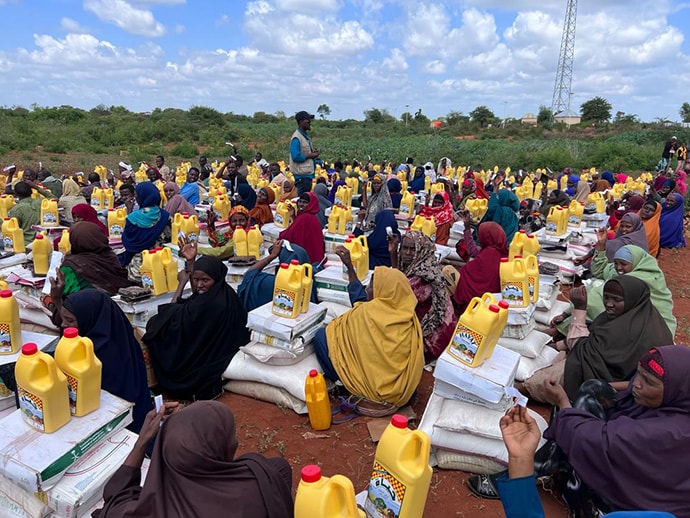
Emergency food distribution supplied by GREDO Somalia. Photo: GREDO
More than 70% of Somali people depend on livestock and agriculture. The majority live in rural areas depending on the food and incomes they get from this ecosystem of resources (i.e. farmlands, water, and rangeland products). Climate effects on this livelihood base have contributed to sharp declines in food production and mass rural-to-urban migration, increasing the number of internally displaced households in urban areas. Climate and conflict induced humanitarian crises affects millions of the most vulnerable Somali people, particularly women and children, people living with disability, elderly, marginalized, and other minority groups.
In recent years, Somalia has also grappled with severe flooding, particularly along the Shabelle and Juba rivers, leading to displacement, destruction of infrastructure, and increased risk of waterborne diseases. The country is also vulnerable to tropical cyclones and tropical storms which threaten coastal communities.
In 2024, 6.9 million people in Somalia will need humanitarian assistance, according to the UN Office for the Coordination of Humanitarian Affairs (OCHA).
With a background in Dryland Agriculture and a decade-long commitment to serving vulnerable communities, Cabdinasir embodies the values that drive GREDO.
Over email, Cabdinasir says his path into humanitarian work was spurred by a deep-seated desire to alleviate the suffering of vulnerable people and communities grappling with extreme poverty, climate shocks, and conflict-induced crises.
“More specifically,” he writes, “I’m interested working with [the] most vulnerable groups such as children and their families, people living with disability and unemployed youth.”
Over the past decade, he has been actively engaged in responding to humanitarian emergencies and facilitating community development initiatives.
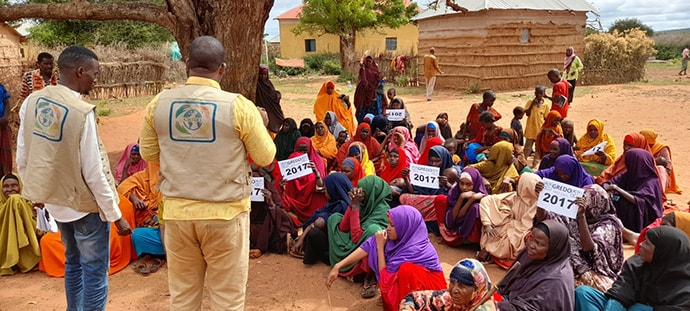
Photo showing community mobilization during 2023 drought emergency. Photo: GREDO
Established in 1992, GREDO provides essential services to communities affected by conflict, droughts, and other emergencies. With its mission to foster a prosperous and dignified society, GREDO has been instrumental in delivering vital assistance to millions of individuals across South and Central Somalia.
GREDO’s holistic approach to humanitarian relief and development encompasses a wide array of services, including food security, livelihoods support, nutrition, healthcare, and WASH (Water, Sanitation, and Hygiene). By working closely with local communities and stakeholders, GREDO strives to address the unique needs of each community while promoting inclusion, gender equality, and human rights.
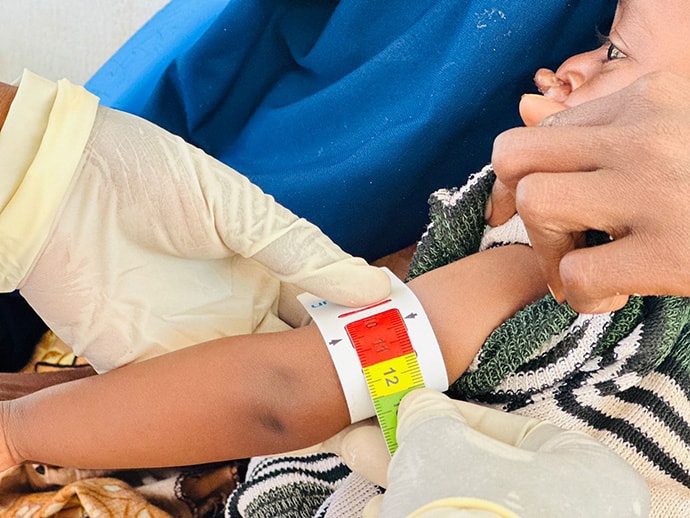
Treatment of malnutrition at emergency health and nutrition site, 2023. Photo: GREDO
In his role as the Food Security and Livelihoods Manager at GREDO, Cabdinasir shoulders a multitude of responsibilities–from overseeing activities to proposing innovative approaches tailored to the fragile context of Somalia, his role encompasses strategic planning, project coordination, and stakeholder engagement.
At the core of GREDO’s philosophy lies a profound belief in the collective action of stakeholders and the resilience of local communities. Through food assistance, cash transfers, emergency water, sanitation facilities, and healthcare services, GREDO’s emergency relief efforts play a crucial role in saving lives and alleviating suffering.
Monitoring and evaluation of these relief efforts is paramount for GREDO, including frequent site visits, encouraging third-party collaborations, and checking feedback channels, GREDO strives to continuously assess and improve its interventions to better serve these communities in need.
And their efforts are having an impact. Since their founding, GREDO has been able to provide 1.3 million people in south and central Somalia with live-saving food assistance, drinking water, life-saving treatments for malnourished children and their mothers.
Amidst the backdrop of ongoing global challenges, including climate change, natural disasters, and conflict, Cabdinasir remains deeply concerned about the plight of vulnerable populations in Somalia. But he remains “hopeful to see significant reduction of people suffering from humanitarian crises and who can cope through their own capacities.”
GREDO Somalia is committed to working with communities to support their capacity to withstand climate vulnerabilities through locally lead or community lead practices. Vulnerabilities associated with climate change are addressed by working with the community to use practices that are not harmful to the environment, that strengthen community preparedness to reduce loss and damage, and that promote approaches or innovative solutions that build community and individual resilience while supporting sustainable development. Learn more at gredosom.org.
Back to Top
Welcome New Members
Please welcome our newest Global Washington members. Take a moment to familiarize yourself with their work and consider opportunities for support and collaboration!
Global Communities
Global Communities brings together local ingenuity and global insights to save lives, advance equity and secure strong futures. We achieve this mission in collaboration with a wide range of public and private sector partners, including communities directly affected by poverty, disasters and conflict. Globalcommunities.org
Gargaar Relief and Development Organization (GREDO)
GREDO’s mission is to improve the living standards of the served communities by delivering effective Emergency Response, Resilience interventions, promoting local capacities and resources, and sustainable development interventions in partnership with stakeholders. gredosom.org
LEAD Cameroon
LEAD Cameroon is an association doing in leadership for environment and development by creating and sustaining a new breed of global leaders who are committed to promote sustainable development in Cameroon in particular and Central Africa in general.
Perrenial
Perennial’s work sits at the intersection of leadership, social justice, and human development. Its mission is to support global social leaders in rejuvenating and sustaining themselves within the frameworks of their communities, leadership roles, causes, and personal lives. A leader’s skill lies in their capacity to resonate internally with their purpose and externally with the individuals and communities they serve. perennial.org
Purpose and Distinction
Anne Wiliams’ consulting firm that uses rigorous brand management framework and learning from behavioral science to help mission-driven companies and organizations unlock the power of brands to carry out their purpose and execute with distinction. Purposeanddistinction.com
Back to Top
Member Events
February 13: War in the Middle East Lecture Series: Regional Repercussions of the War
February 20: War in the Middle East Lecture Series: The U.S. and Crisis Response
February 27: War in the Middle East Lecture Series: Israel-Hamas: Will this be the Last War?
March 23: The Max Foundation: Maximize Life Gala
June 4: International Rescue Committee (IRC) Annual Fundraising Dinner
Back to Top
Career Center
Director, Partnerships & Development Global Impact
HR & Accounting Coordinator The Max Foundation
Program Assistant, Primary Healthcare, HIV, TB, Viral Hepatitis (JR808) PATH
Senior Associate, Major Gifts UNHCR
Check out the GlobalWA Job Board for the latest openings.
Back to Top
GlobalWA Events
March 14: Q1 Final Mile Logistics Working Group Meeting featuring Maersk
Back to Top
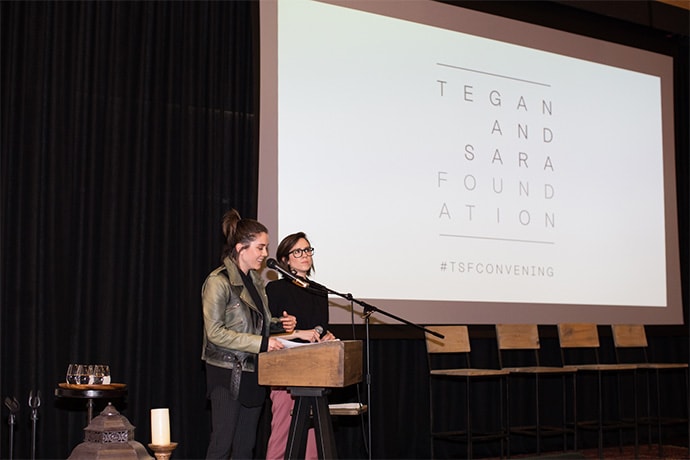
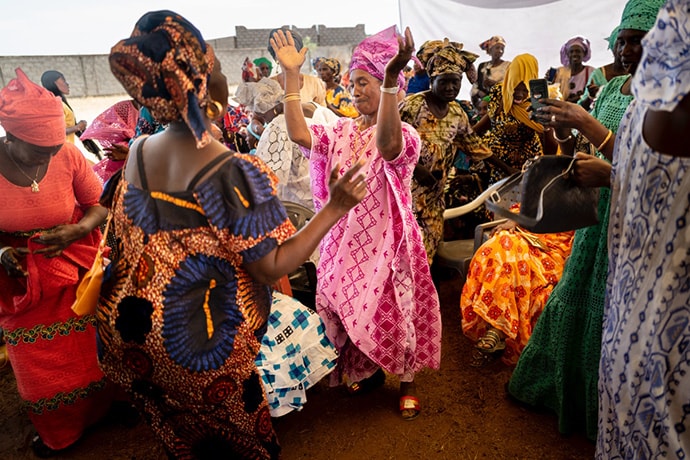
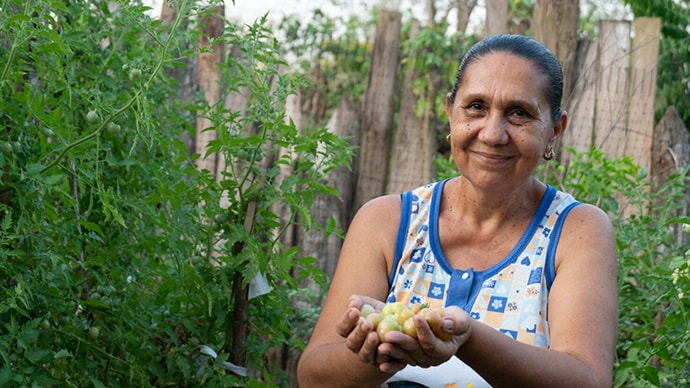
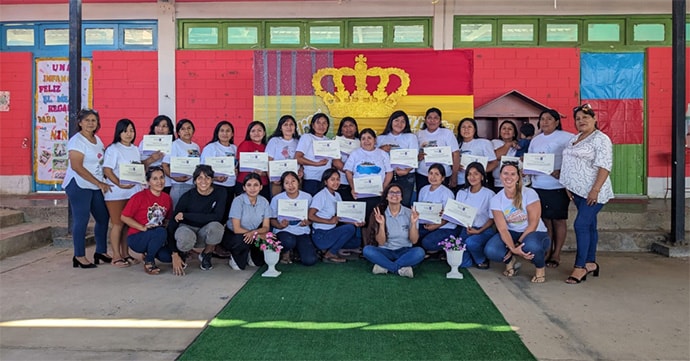
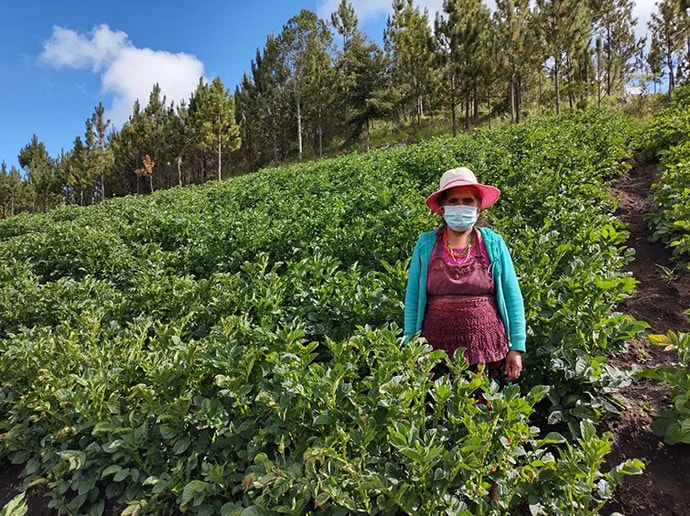
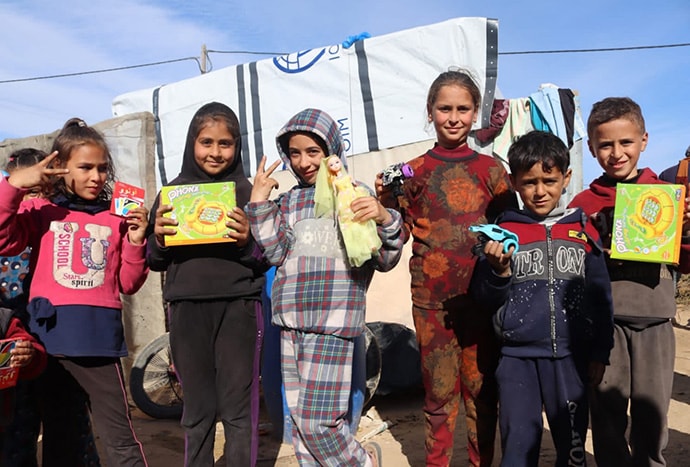
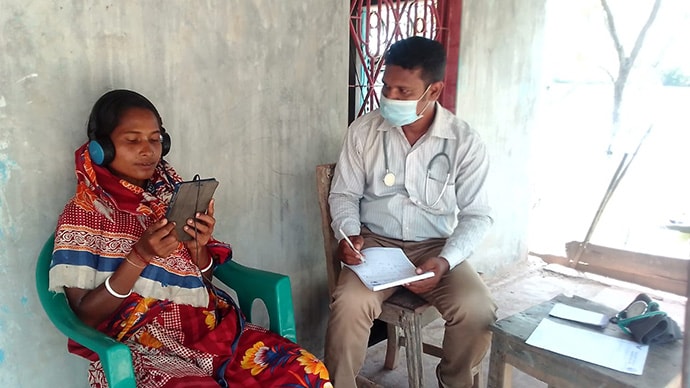
 Natural disasters across the world are increasing in frequency and intensity, which can be linked to climate change. Scientific modeling predicts that these trends will increase in the future. Thus, the work our Global Washington members engage in to respond and mitigate natural disasters is more important than ever. Our Global Washington members are leveraging advanced technology alongside localized community engagement, which proves to be a powerful approach for building resilience against climate-related disasters in low- and middle-income countries. Here are some key elements used by GlobalWA members, and read more in the articles following.
Natural disasters across the world are increasing in frequency and intensity, which can be linked to climate change. Scientific modeling predicts that these trends will increase in the future. Thus, the work our Global Washington members engage in to respond and mitigate natural disasters is more important than ever. Our Global Washington members are leveraging advanced technology alongside localized community engagement, which proves to be a powerful approach for building resilience against climate-related disasters in low- and middle-income countries. Here are some key elements used by GlobalWA members, and read more in the articles following.

















